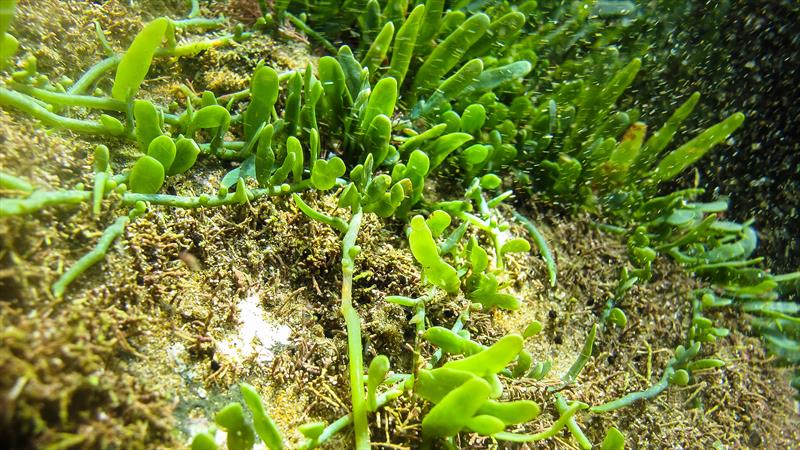
Biosecurity Rules issued for Aotea Great Barrier Island to control new seaweed pest
by Zoe Hawkins 27 Sep 2021 22:00 NZDT
27 September 2021

Caulerpa brachypus– an unwanted organism that is known to spread rapidly, form dense mats and potentially overrun native species © Marine Biosecurity NZ
If you’re planning to sail to Aotea Great Barrier Island, there are currently biosecurity rules in place there to control a newly discovered seaweed pest.
Biosecurity New Zealand has placed legal controls affecting some vessel activities in Blind Bay and Tryphena Harbour to try to prevent the movement of Caulerpa brachypus– an Unwanted Organism that is known to spread rapidly, form dense mats and potentially overrun native species.
Biosecurity New Zealand is working in partnership with the Aotea Mana Whenua governance group which has imposed a rahui over the same areas.
John Walsh, Biosecurity New Zealand’s Director of Readiness and Response, says Caulerpa brachypus can spread to new locations as small fragments and is easily moved by people going about water activities like boating and fishing.
“For this reason, we’ve imposed what’s known as a Controlled Area Notice, which will restrict certain activities in the infested bays to minimise spread while we assess how widespread the pest is and what can be done about it.
“Under the controls, in Blind Bay and Tryphena Harbour it is now illegal to take any seafood or other marine life. Anchoring in the two areas is banned without a permit from Biosecurity New Zealand.
“In addition, all equipment used for marine activities – for example, footwear, wetsuits, craypots, dredges, and boat trailers – cannot be removed from the Controlled Areas without first checking for seaweed and removing it, leaving it in the waterbody it came from.”
Mr Walsh says the controls aim to protect the island's wider coastline, and other parts of New Zealand, while still allowing many of the routine activities of mana whenua and local people.
"People can still swim, dive, paddle or use a vessel in the Controlled Areas, so long as they don't drop anchor. If they do, they’ll need a permit to move out.
"It's the movement of equipment along the seabed which poses the risk of picking up fragments of Caulerpa and moving it elsewhere," Mr Walsh explains.
At this stage, the controls are in place until at least the end of November.
If you are using Aotea coastal waters or planning to visit there, full detail about the situation and the legal controls is at: www.biosecurity.govt.nz/caulerpa
With lockdowns placing additional pressure on boat cleaning facilities this year, we recommend that you book your pre-summer clean in early.
Most boatyards are operating in Level 3, and it’s business as usual in Level 2. Boaties can get info on keeping their boat cleaned and well maintained, find a local haulout, and check up on the rules, at www.marinepests.nz